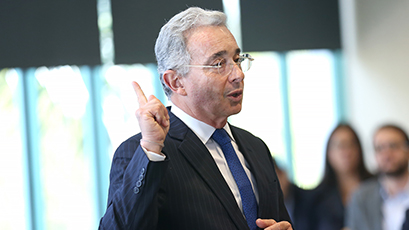Invited to the School by Roberto Rave, an MBA student who serves as an advisor to the Republican Congress of Colombia, the former president discussed the current state of economies in Latin America and the necessity to strengthen democracy to improve the quality of life.
“Democratic values and a private sector are a must for the country to progress,” Uribe said. “When there isn’t a high education level, well, people must go to another country to find it.”
Uribe, who is credited with reducing Colombia’s crime and poverty rates when he served as the war-torn nation’s 31st president, was as warmly received by the class as he is in his homeland. During his 2002-2012 presidency, homicides, kidnappings, and poverty dropped considerably, and Uribe left the top office with a 75 percent approval rating.
“He is the guide and shares in our sense of patriotism,” Rave said of Uribe.
The visit marked Uribe’s second time to the University of Miami; during his first visit in November 2015, he spoke out against the peace negotiations his successor, Juan Manuel Santos, initiated with the Revolutionary Armed Forces of Colombian (FARC), warning that the negotiations would weaken the country’s institutions. His vocal opposition was seen as critical to last year’s failure of a national referendum on the peace accord.
During this most recent visit, Uribe echoed many of the sentiments he expressed previously, particularly his call for democracy and his belief in Latin America’s ability to be incredibly successful.
“In Cartagena, there is an acceptable quality of life on the side of the city that has industry,” he said. “On the other side, it is full of poverty due to the lack of (business).”
Pointing to Venezuela as an example of a country that should not be in its current state of impoverishment and turmoil, Uribe told the story of the time he advised the late Venezuelan President Hugo Chávez that Venezuela needed a strong private sector because the country’s oil wealth would not sustain it forever. Chávez’s answer was that the late Cuban dictator, Fidel Castro, told him Venezuela did not need one.
The former president also urged the crowd to seek more information, especially since technology is so readily available.
“I had to ask my son how to use my first MacBook,” he joked. “I watched so much television and read so many newspapers.”
The audience showed their admiration for Uribe in a question-and-answer session following his lecture. At one point, he mentioned the books he was reading and a few in the crowd nodded their heads; two women excitedly said they also had them.
As the two-hour talk ended, Uribe urged governments to be more responsible to the people they represent.
“There are three factors that should be in the model: confidence in investments, strengthening the press, and having integrity in your region,” Uribe said.
The Miami Executive MBA en Español program enables professionals to enhance their business knowledge, improve their management skills and strategic decision-making abilities, and expand their professional network through close interaction with a select group of business leaders from across Latin America.
Classes are taught in Spanish over 18 months, with most sessions held on the University of Miami’s main campus in Miami. The program is divided into seven two-week sessions.

